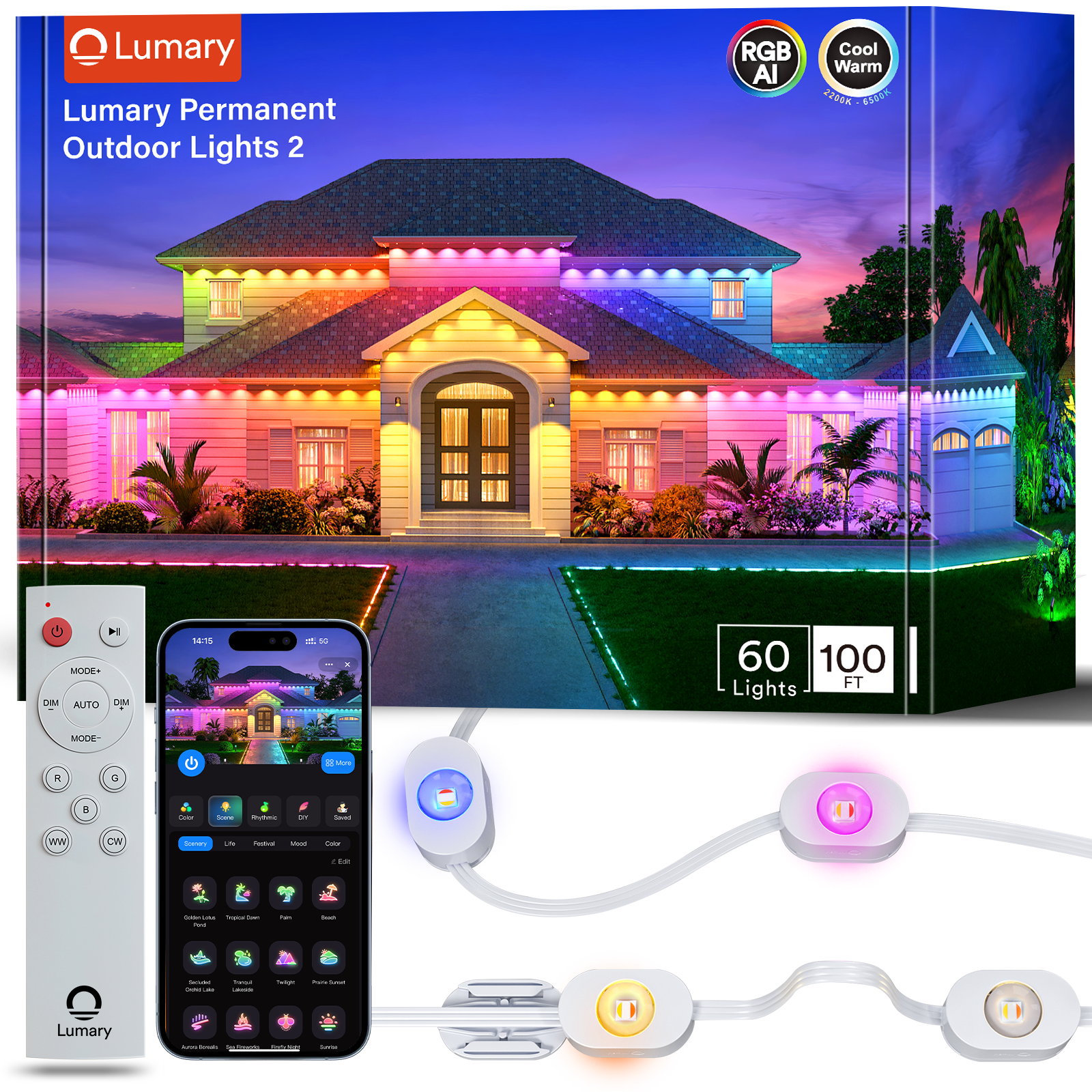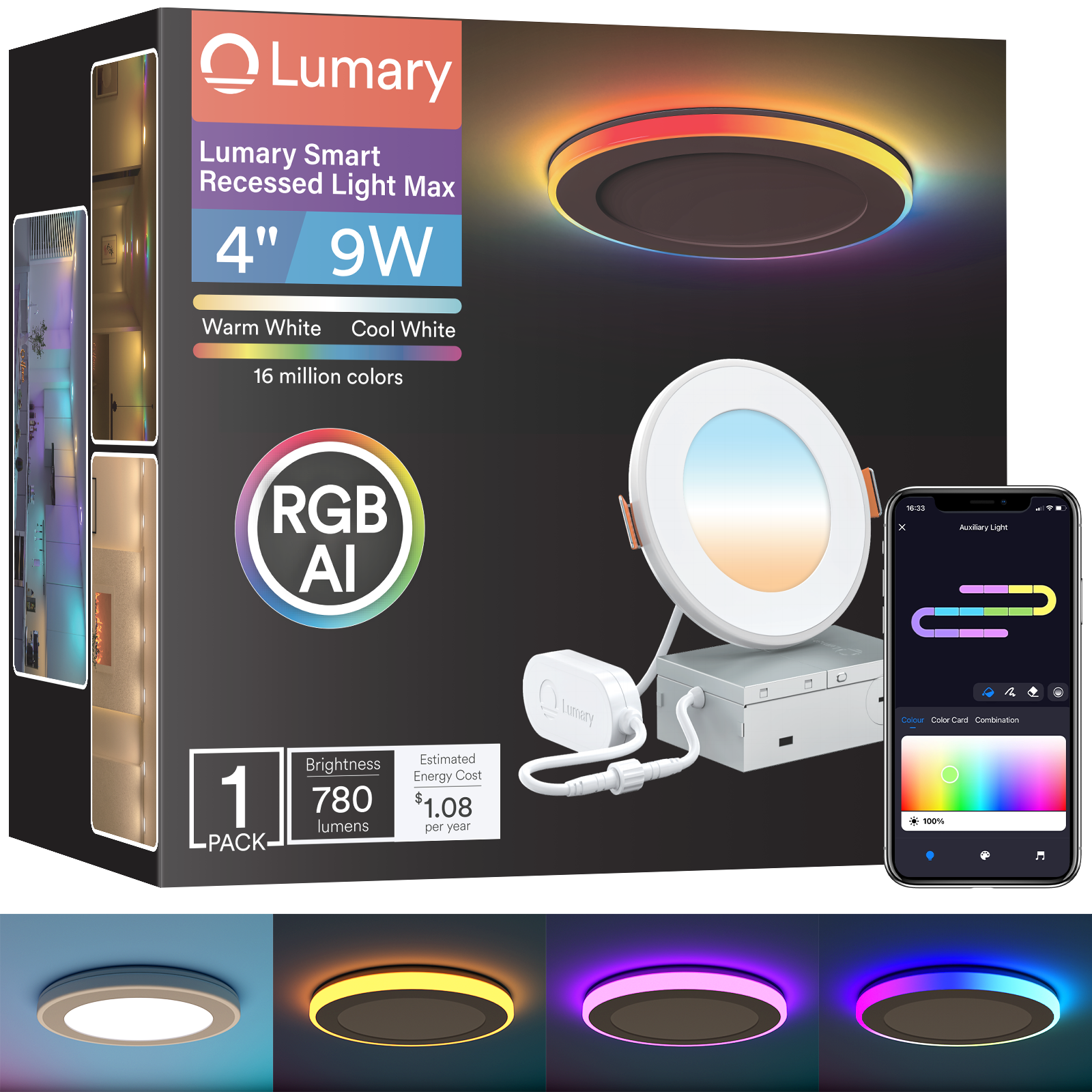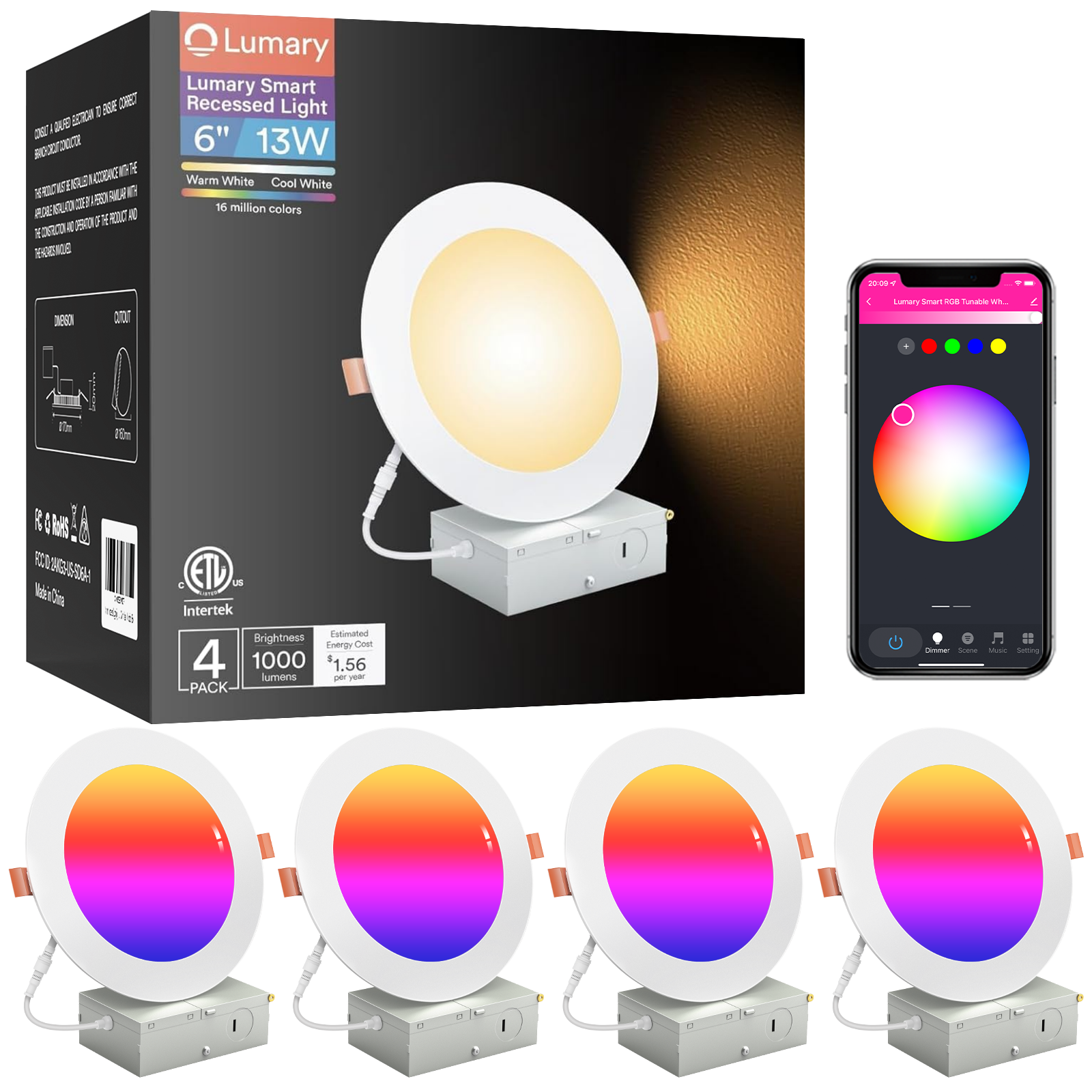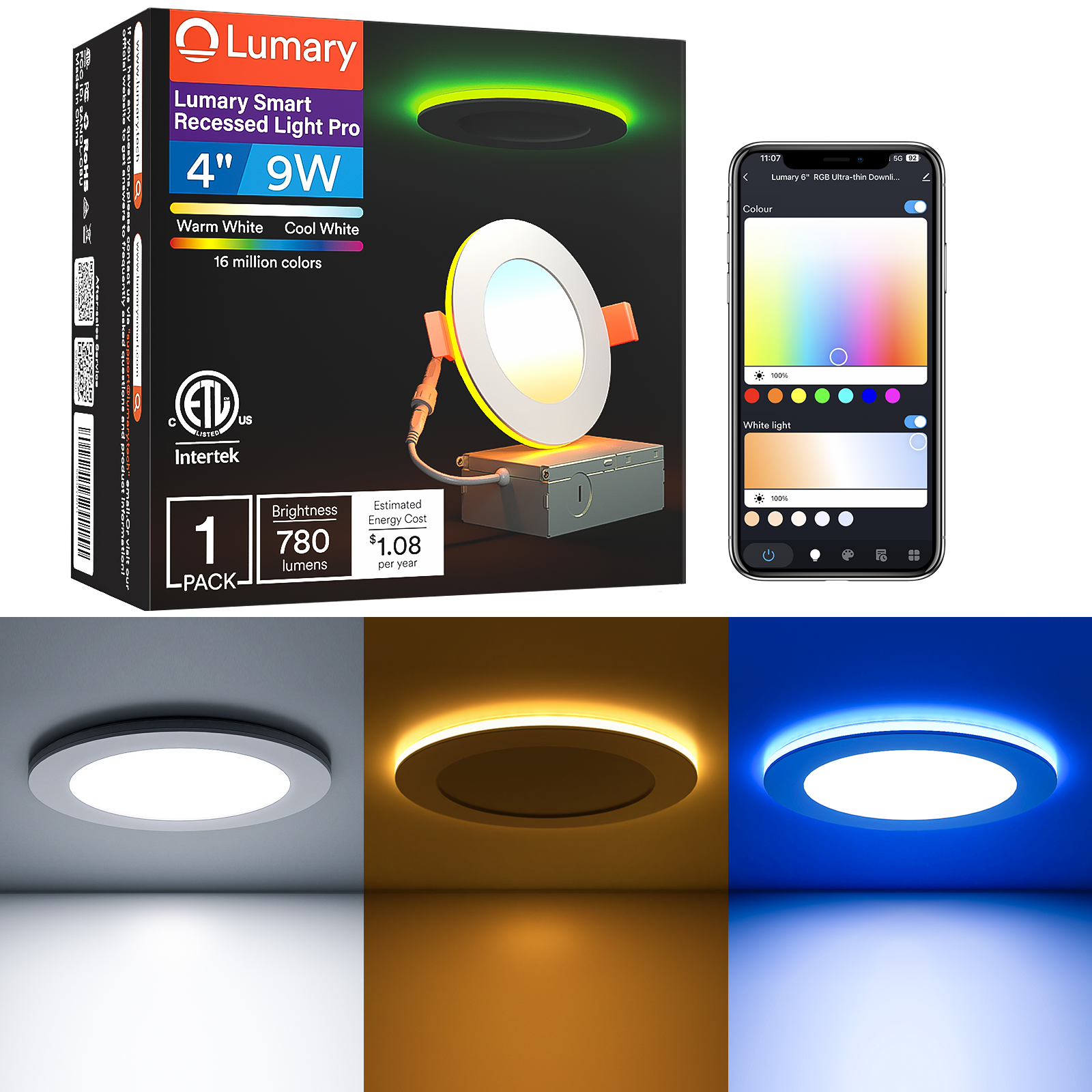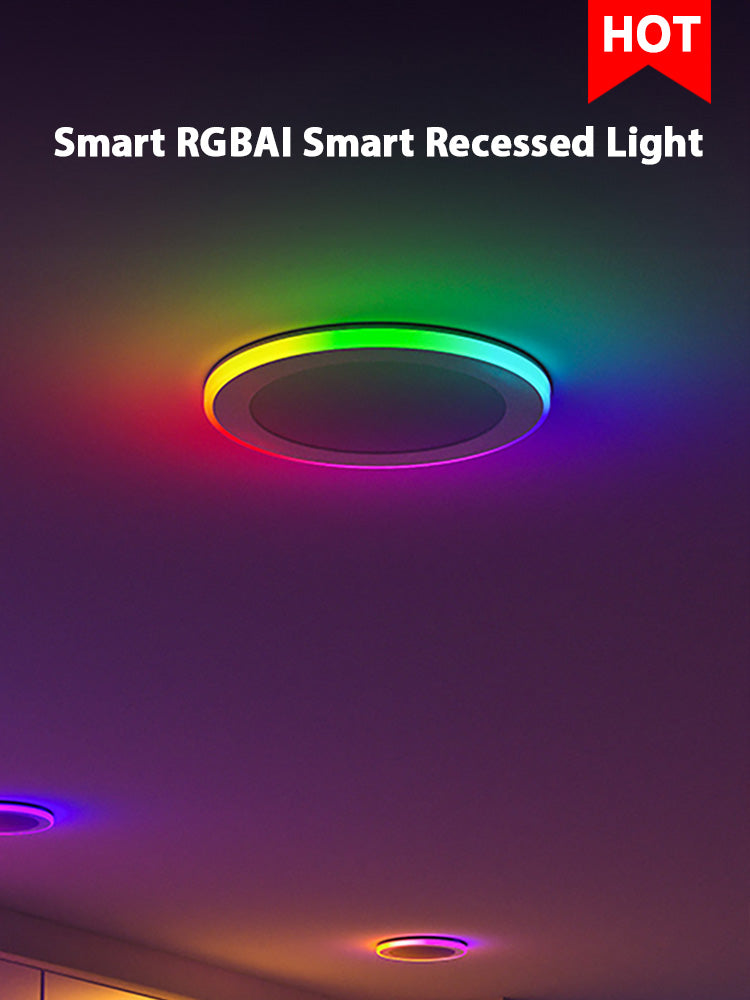Smart lights have gained immense popularity in 2024. The global market size for smart lighting is estimated to reach USD 19.65 billion. This growth highlights the increasing demand for innovative lighting solutions. Choosing the right smart light can transform any living space. Smart lights offer energy efficiency, convenience, and enhanced ambiance. Selecting the best option requires understanding individual needs. Consider factors like brightness, color options, and compatibility with smart home systems. Making an informed choice ensures satisfaction and maximizes the benefits of smart lighting technology.
Top Smart Light Brands of 2024

Lumary
Unique Selling Points
Lumary offers a unique blend of versatility and innovation in smart lighting. The Lumary Smart RGBAI Recessed Light with Gradient Auxiliary Night Light stands out with its adjustable color temperature, ranging from 2700K to 6500K. The main light provides white illumination, while the auxiliary light offers 22 default color combinations and 44 scene modes. Users can control the light through the Lumary app or voice assistants like Alexa, Google Assistant, and Siri.
Key Features
-
Adjustable color temperature: 2700K to 6500K
-
22 color combinations and 44 scene modes
-
Control via Lumary app, Alexa, Google Assistant, and Siri
-
Can-less design for easy ceiling installation
-
Average lifespan: 25,000 hours
Pros and Cons
Pros:
-
Versatile lighting options
-
Easy integration with smart home systems
-
Long lifespan
Cons:
-
Limited to recessed lighting applications
-
Requires app or voice assistant for full functionality
Philips Hue
Unique Selling Points
Philips Hue is renowned for its comprehensive range of smart lighting solutions. The brand offers 16 million colors and seamless integration with Amazon Alexa, Google Assistant, and Apple HomeKit. The Hue White Starter Kit provides a tunable white ambiance, while the Hue Color Ambiance adds millions of color options for creative control.
Key Features
-
16 million color options
-
Integration with Alexa, Google Assistant, and HomeKit
-
Energy-saving LED technology
-
Customizable settings and preset scenes
-
Bluetooth and Zigbee connectivity
Pros and Cons
Pros:
-
Extensive color and control options
-
High compatibility with smart home systems
-
Energy-efficient technology
Cons:
-
Requires a hub for full feature access
-
Higher price point compared to some competitors
Wyze
Unique Selling Points
Wyze provides affordable smart lighting solutions without compromising on quality. The brand offers smart bulbs that rival larger brands at a fraction of the cost. Wyze smart lights are ideal for budget-conscious consumers seeking reliable performance.
Key Features
-
Affordable pricing
-
Reliable performance
-
Compatibility with major smart home systems
-
Easy setup and user-friendly app
Pros and Cons
Pros:
-
Cost-effective smart lighting
-
Simple installation process
-
Good compatibility with smart home systems
Cons:
-
Limited advanced features compared to premium brands
-
Basic design options
Comparison Table
Features Comparison
Brightness Levels
Smart lights offer different brightness levels to suit various needs. Lumary provides a brightness of 780 lumens, ideal for most home settings. Philips Hue offers a range of brightness options, with some models reaching up to 1,100 lumens. Wyze smart bulbs typically offer around 800 lumens, providing adequate lighting for budget-conscious users.
Color Options
Color options enhance the versatility of smart lights. Lumary features an impressive palette of 16 million colors, allowing for endless design possibilities. Philips Hue also offers 16 million colors, making it a favorite for those seeking vibrant and customizable lighting. Wyze provides essential color options, suitable for users who prioritize affordability over extensive customization.
Compatibility with Smart Home Systems
Compatibility with smart home systems ensures seamless integration. Lumary works with Alexa, Google Assistant, and Siri, offering flexibility in control. Philips Hue integrates with Amazon Alexa, Google Assistant, and Apple HomeKit, providing extensive compatibility. Wyze supports major smart home systems, ensuring reliable performance at a lower cost.
Price Comparison
Budget Options
Budget-conscious consumers often seek affordable smart lighting solutions. Wyze offers cost-effective options without compromising quality. Sengled and Cree Connected LED Bulb also provide budget-friendly choices, making smart lighting accessible to more users.
Mid-Range Options
Mid-range options balance price and features. Lumary offers versatile lighting solutions at a reasonable price point. TP-Link Kasa Smart Bulb and Sylvania Smart Plus smart LED light bulb fall into this category, providing reliable performance with added features.
Premium Options
Premium smart lights offer advanced features and superior performance. Philips Hue represents the premium segment with its extensive color options and high compatibility. Lifx and Nanoleaf Shapes Kits also cater to users seeking top-tier smart lighting solutions, offering vibrant colors and unique designs.
Detailed Reviews
In-Depth Review of Lumary
Performance Analysis
Lumary smart light offers impressive performance with its RGBAI technology. The light provides a brightness of 780 lumens, suitable for various home settings. Users can enjoy an extensive palette of 16 million colors. The adjustable color temperature ranges from 2700K to 6500K, allowing for versatile lighting options. The smart light integrates seamlessly with Alexa, Google Assistant, and Siri, enhancing convenience through voice commands.
User Experience
Users find the Lumary smart light easy to install and operate. The separate control box ensures a strong signal, making connectivity straightforward. The Lumary app allows users to adjust brightness and color settings effortlessly. The Music Rhythm Mode adds a fun element by syncing lights with music, creating an engaging atmosphere for gatherings. Many users appreciate the hands-free operation provided by voice control.
Value for Money
Lumary smart light offers excellent value for money with its combination of features and performance. The energy-efficient design ensures long-term savings on electricity bills. The customizable settings and easy integration with smart home systems make it a worthwhile investment. Users seeking a versatile and reliable smart light will find Lumary a great choice.
In-Depth Review of Philips Hue
Performance Analysis
Philips Hue smart lights deliver outstanding performance with their extensive color options. The lights offer up to 16 million colors, providing endless possibilities for customization. The energy-saving LED technology ensures efficient power consumption. Philips Hue integrates with major smart home platforms like Amazon Alexa, Google Assistant, and Apple HomeKit, offering flexible control options.
User Experience
Users praise Philips Hue for its user-friendly setup and operation. The Bluetooth and Zigbee connectivity options provide flexibility in managing the lights. The Philips Hue app offers features like brightness adjustment, color selection, and scheduling. Users can create preset scenes for different occasions, enhancing the ambiance of any room. The seamless integration with smart home systems enhances the overall user experience.
Value for Money
Philips Hue represents the premium segment of smart lights with its advanced features. The higher price point reflects the quality and compatibility offered by the brand. Users seeking top-tier smart lighting solutions will find Philips Hue a valuable investment. The extensive color options and energy-efficient technology justify the cost for those looking for high-quality smart lights.
In-Depth Review of Wyze
Performance Analysis
Wyze smart lights provide reliable performance at an affordable price. The lights offer essential features like brightness adjustment and basic color options. Wyze smart lights integrate with major smart home systems, ensuring compatibility and ease of use. The simple installation process makes Wyze an attractive option for budget-conscious consumers.
User Experience
Users appreciate the straightforward setup and operation of Wyze smart lights. The user-friendly app allows for easy management of lighting settings. Users can adjust brightness and schedule lighting changes remotely, enhancing convenience. The integration with popular smart home platforms provides a cohesive smart home experience.
Value for Money
Wyze smart lights offer excellent value for money with their cost-effective pricing. The reliable performance and compatibility with smart home systems make Wyze a smart choice for those on a budget. Users seeking affordable smart lighting solutions without compromising quality will find Wyze a suitable option.
Enhancing Smart Light Usage

Tips for Optimal Setup
Placement Tips
Optimal placement of smart lights enhances the ambiance and functionality of any space. Position smart lights to highlight key areas like workspaces, reading nooks, or art displays. This approach ensures focused lighting where needed most. Consider using recessed smart lights for a sleek look in living rooms or kitchens. Avoid placing smart lights near reflective surfaces to prevent glare. Strategic placement maximizes the benefits of smart lighting technology.
Connectivity Tips
Reliable connectivity is crucial for seamless smart light operation. Ensure a strong Wi-Fi signal throughout your home. Place smart lights within range of your router for optimal performance. Use a dedicated smart home hub if multiple devices connect simultaneously. This setup reduces network congestion and improves response times. Regularly update the smart light app to access new features and improvements. Consistent connectivity enhances the user experience.
Maximizing Energy Efficiency
Energy-Saving Modes
Smart lights offer energy-saving modes that reduce electricity consumption. Activate dimming features to lower brightness when full illumination is unnecessary. Use motion sensors to turn off lights automatically in unoccupied rooms. Energy-efficient LED technology in smart lights contributes to lower electricity bills. Choose smart lights with energy-saving certifications for added assurance. These practices promote environmental sustainability and cost savings.
Scheduling and Automation
Scheduling and automation optimize smart light usage. Set schedules for smart lights to turn on and off at specific times. This feature provides convenience and security, especially when away from home. Use automation to adjust lighting based on natural daylight levels. Smart lights can gradually brighten in the morning, simulating a natural sunrise. Implementing these strategies ensures efficient energy use and enhances daily routines.
FAQ Section
Common Questions
Installation Queries
Smart light installation often raises questions. Many users wonder about the tools needed for setup. Most smart lights require basic tools like a screwdriver. Some models offer a can-less design for easy installation. Users should ensure the power is off before starting the process. Following the manufacturer's instructions ensures a smooth installation.
Compatibility Concerns
Compatibility with smart home systems is crucial for seamless operation. Users frequently ask if their smart lights work with Alexa, Google Assistant, or Apple HomeKit. Most leading brands offer compatibility with these platforms. Checking the product specifications helps confirm compatibility. Users should ensure their smart home system is up-to-date for optimal performance.
Troubleshooting Tips
Troubleshooting common issues can enhance the smart lighting experience. Users often face connectivity problems. Ensuring a strong Wi-Fi signal can resolve many issues. Placing the smart light within range of the router improves connectivity. Regularly updating the smart light app provides access to new features and fixes. If problems persist, contacting customer support offers additional assistance.
Methodology
Review Process
Criteria for Selection
The selection of smart lights involves several key criteria. Brightness plays a crucial role in determining the effectiveness of smart lighting. The ability to adjust brightness levels enhances energy efficiency and ambiance. Color accuracy ensures that the lighting meets aesthetic needs. Compatibility with various smart home systems is essential for seamless integration. Ease of installation simplifies the setup process for users. Energy efficiency contributes to reducing electricity bills and promoting sustainability. Long-term reliability ensures that the smart lights provide consistent performance over time.
Testing Procedures
Testing smart lights requires a systematic approach. Start by evaluating the brightness levels under different settings. Assess the color accuracy by comparing the light output to standard color charts. Test the compatibility with popular smart home systems like Alexa, Google Assistant, and Apple HomeKit. Install the lights in various environments to gauge ease of installation. Monitor energy consumption to determine efficiency. Conduct long-term tests to assess reliability and performance consistency. These procedures ensure that the smart lights meet user expectations and deliver value.
Smart light technology offers a transformative experience for any home. Lumary, Philips Hue, and Wyze represent the top smart light brands of 2024. Each brand provides unique features that cater to different preferences and budgets. Smart lights enhance convenience and energy efficiency. Users can enjoy personalized lighting that matches their moods and activities. Selecting the right smart light involves understanding key features like compatibility and control options. Explore these options to find the best smart light for your needs. Smart lighting systems are replacing traditional solutions due to their economical and sustainable nature.



